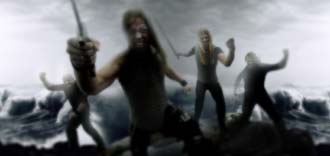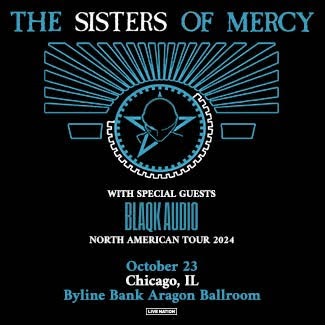Hail To The Hammer

Few bands can claim their home country’s best-selling album. Even fewer are heavy metal bands. A “Viking metal” metal band? No way.
Heri Joensen and his Tyr bandmates (Terji Skibenaes, Gunnar H. Thomsen, and Kári Streymoy) can boast such a feat, though. At one time (and maybe still, Joensen says) Eric The Red (2003; Tutl – re-released in 2006 by the band’s current label, Napalm) was The Faroe Islands’ most-popular album. Of course, The Faroes’ – 18 islands and 545 square feet – population is roughly 48,500, so competition isn’t exactly cutthroat. But hey, the most popular album! The country’s tourism Web site even brags about the headbanging native sons!
Considering it is touring the United States for the second time in a year (March 11th at The Pearl Room in Mokena with Alestorm and Suidakra), Tyr’s popularity doesn’t seem confined to its homeland. Joensen took a break from recording the band’s new record (April release), By The Light Of The Northern Star, to phone “Mosh.”
M: The new album will be released less than a year after Land. Why so fast?
HJ: There are several reasons, I think. Land did not receive the great welcome that we hoped for. At least not compared to Ragnarok. And the intentions we had with [Land] didn’t quite work out because even though a lot of people, especially readers, liked Ragnarok, it was called a very progressive album, not easily accessible record. So we tried to make a make a much simpler and [more] accessible album with Land, but most readers have called it an even more complex album. So we kind of changed the formula. We have plenty of material, so there’s no reason to wait.
M: Land was fantastic, though. That must have been disappointing.
HJ: Yeah, it’s not catastrophic, though. I think it sold more than Ragnarok, so it’s doing O.K. I was disappointed that it didn’t work out as I intended. I clearly don’t see the music as the listeners do. I think it’s a much simpler and straightforward album, but people disagree with me.
M: Last year you toured the United States for the first time as part of Paganfest. You’re coming back, so it must have gone well?
HJ: Yes, yes, it went quite well. Over the expectations of the people who arranged it, at least.
M: What were your expectations, having never toured here before? Did you have any?
HJ: Yeah, I did actually because a lot of people have been writing to us for a long time – since the first album – asking when we were going to come to the U.S. People have been asking, and apparently they all turned out. Yeah, I was expecting a little bit, but it went over my expectations as well. I mean, the amount of people every night who knew the songs by heart – I did not expect that. People singing along in Faroese, you know?
M: Are you surprised at how popular “Viking metal” has become?
HJ: I don’t know to what extent I’m surprised. There’s a lot of bands in this genre who have worked very hard for many years to make a living of this. And then there are a lot of other bands, probably more, who just jump on the bandwagon to be part of the trend. When that starts, it’s a sign that something is happening. I don’t know really which end it starts from, but we got into this not knowing anything about Viking metal, Pagan metal, folk metal . . . anything. We just did this completely naturally. I didn’t know any of the bands that we are associated with now when we started. I think that goes for some of the other bands from Scandinavia. So it’s a very natural development for metal right now. Exactly why that is, I think is a very complicated question. But this music feels very natural to me, so I’m not personally surprised that it’s popular because I like it.
M: What about the term Viking metal? Silly?
HJ: Yeah, I’ve never been fond of these labels because . . . take for example Viking metal. Bands like Amon Amarth or Bathory are called Viking metal, but they sound nothing like us; we sound nothing like them. So it’s a useless term. If all those bands are Viking metal, than Viking metal really doesn’t apply to a style of music. You can combine any terms you like, Viking, Pagan, folk, whatever, and you’ll never describe to people what the music is. But on the other hand, I see the necessity to have some kind of labeling, and I will use it if people ask, but I’m pretty indifferent about it.
M: Do you listen to other bands now?
HJ: Yes I do, and I like some of them very, very much. The second tour we were on was with Vintersorg and Amon Amarth, and those [bands], I didn’t appreciate the music so much, when we were on the tour, which I regret because now they are my two absolute favorite bands. I look so much forward to the [new] Vintersorg. So yeah, I’m into the stuff so much now, and it probably rubs off on our playing. We have been very musically different from the rest of the Viking metal scene, but I think we’re getting closer by each album.
M: Tyr combines traditional tunes with its own songwriting, so what comes first?
HJ: I always start with a traditional melody. I might hear it on the radio, I might have it on CD, or I might know it from memory, and I just try to put some chords to that and see what I can make out. If it sounds good to me I’ll work further on it and put some heavy metal to it. That’s about 95 percent of our songs. Occasionally I find a cool riff, make a melody to it myself, but it usually turns out pretty folky anyway.
M: What about lyrics? How do you decide if you’re going to do a song in English or Faroese?
HJ: That’s an issue for me, that I’m not quite so comfortable with. It’s very difficult for me to write a lyric in Faroese that I’m satisfied with. It’s much easier in English because I’m used to hearing heavy metal in English, and it sounds much more natural to me.
M: I would have thought the opposite, but that makes sense.
HJ: Yeah, there’s no famous heavy metal band that sings in Faroese so there’s no way for that to sound natural. But I’m working on it. I’ve written very few lyrics in Faroese because most of them are traditional – so I didn’t write them, I just used them. The few that I have written, there are two whole songs then there are bits and pieces in several songs. I work on it for a very long time, and it takes a lot for me to be satisfied with it. So to write a whole album in Faroese would take a lot of energy for me, and I don’t usually have time for it. It’s happened more than once where I start something in Faroese and then I say “Fuck it,” and then I write the lyrics in English.
NEWS: The schedule and headliners are still to be set, but this year’s Chicago Powerfest goes down May 7th, 8th, and 9th at The Pearl Room, and confirmed bands include Devildriver, Soil, Kiuas, Novembers Doom, Perzonal War, Assailant, Sheephead, and Mindwarp Chamber. The 7th is the kick-off party with the Paganfest 2 tour (Korpiklaani, Primor-dial, Eluvietie, Moonsorrow, Blackguard, and Swashbuckle). Check Chicagopowerfest.com for updates . . . Twenty-something years later and Enforcer will finally release a CD! The Chicago band’s story is fascinating: It formed in the early ’80s armed with awesome, Trouble-ish tunes, released a few demo tapes, and that was it. Yet during an extended period of public inactivity, the original members still rehearsed. Last year Enforcer officially ended its unofficial retirement by playing – and slaying – Metal Up Your Tap (shameless self promotion). On March 31st, Stormspell Records releases 25th Anniversary Remasters, comprising a CD of 12 1984 studio demos/rehearsal tracks and a live DVD.
mosh@illinoisentertainer.com
– Trevor Fisher
Category: Caught In A Mosh, Columns, Monthly










